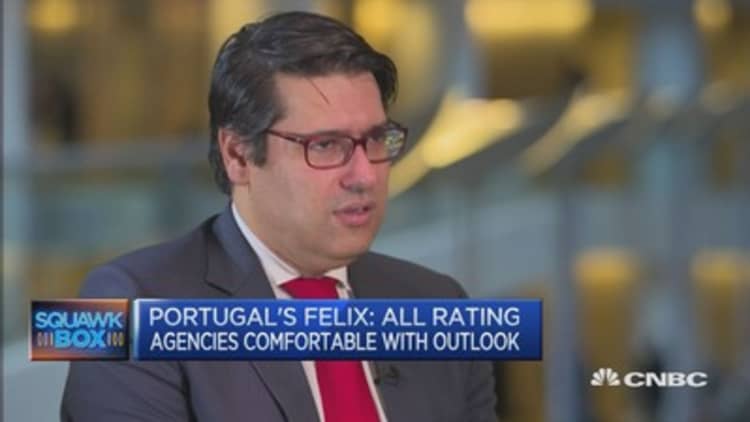
Portugal, whose sluggish economy has imperiled both its credit worthiness and a key central bank lifeline, is confident it will not lose its sole investment grade rating, a top government official told CNBC on Saturday.
In recent weeks, yields on Portuguese debt have risen on fears that ratings agency DBRS would cut the country's rating to junk, following similar moves by Moody's, Standard & Poors and Fitch . Speculative, or junk, ratings raise borrowing costs on sovereign and corporate issuers.
In Portugal's case, it could also mean the loss of access to the European Central Bank's quantitative easing (QE) program. In order to qualify for that liquidity, and for the ECB to take its bonds as loan collateral, Portuguese government debt must have an investment grade rating.
"I would not expect any change in rating or outlook by DBRS on the 21st of October," Ricardo Mourinho Felix, Portugal's Secretary of State for Finance and the Treasury, told CNBC on the sidelines of the International Monetary Fund annual meeting in Washington.
Felix said he met with the ratings agency in Washington this week, adding that the conversations have been co-operative. DBRS is comfortable with the current situation, he said.
"All the contacts with ratings agencies that we have had recently suggest all the agencies are comfortable with their ratings notation and the outlook, provided the government fulfills the target for the current year in fiscal terms," Felix told CNBC.
In addition, the government must present "a budget for 2017 that goes in line with the continuation of the cost reduction process, and that is what the government will do," he added.
In a report last month, the IMF said Portugal's growth was still too slow, and the economy required further reform. Felix, however, dismissed fears that the government was backsliding on its efforts. He stated ratings agencies are encouraged by the country's political stability, and the government's commitment to fiscal consolidation.
Asked if the market could expect upgrades to its ratings, Felix said he would expect this to happen next year when his government had proven its commitment to reform. At that time, longstanding issues with the banking industry should be resolved, he added.
--Reuters contributed to this article.



